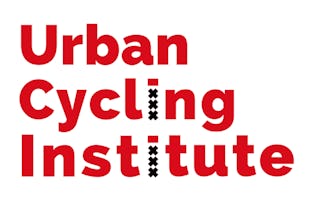What is the future of cycling in our cities that struggle to transition to more sustainable and inclusive forms of mobility? What is the role of innovation in ensuring that cycling becomes easier, safer and more accessible for different groups of people? What are Great Bikes and what are Great Cycling Cities?


Being Smart about Cycling Futures
5 days left! Gain next-level skills with Coursera Plus for $199 (regularly $399). Save now.


Being Smart about Cycling Futures
This course is part of Human Mobility in Future Cities Specialization



Instructors: Marco te Brömmelstroet
1,817 already enrolled
Included with
(11 reviews)
What you'll learn
Critically consider multiple perspectives on the future of cycling
Develop a deeper understanding of cycling practice's relation to infrastructure, its diverse users, and the wider mobility system
Situate cycling (innovations) in the context of inequalities and across different countries
Explore the limits of our society's collective mobility imagination and how to overcome them
Skills you'll gain
Details to know

Add to your LinkedIn profile
See how employees at top companies are mastering in-demand skills

Build your subject-matter expertise
- Learn new concepts from industry experts
- Gain a foundational understanding of a subject or tool
- Develop job-relevant skills with hands-on projects
- Earn a shareable career certificate

There are 6 modules in this course
What will the future of cycling be like? This module introduces you to one of the main ideas of the course: that cycling futures are multiple and contested. You will be introduced to velotopias- visions of urban future in which cycling is the key mode of transportation- and to cycling innovations. You'll learn about the Smart Cycling Futures research project and the paradoxes encountered in researching innovations. You will notice that scholars and innovators have different ideas on how cycling should become a more important part of our lives. The different futures that we envision prioritize different values and different ideas about cities, mobility and human interaction.
What's included
6 videos10 readings3 assignments1 discussion prompt
In this module you will learn about how cycling and cycling innovations are part of a larger mobility system. First, should the goal of innovations always be to get people to shift to cycling from other modes? And, do innovations forget about the people who are already cycling? How does the practice of cycling fit with other modes? This module will also introduce you to the bike-train system, which has become highly developed in the Netherlands.
What's included
4 videos4 readings3 assignments1 discussion prompt1 plugin
How do innovations change the experience of cycling, its meaning, and how it is governed? This week will introduce you to new technologies and smart innovations, including both bicycles themselves and also bike infrastructure, accessories, and mobile applications. You will learn to recognize how innovations are shaped by the context in which they are developed. You'll understand how innovations can shape futures of cycling, and recognize moments where we may be choosing one future over another. We will also zoom into specifically to the subject of e-bikes, through an academic paper and a conversation with bike component manufacturer enviolo.
What's included
3 videos4 readings3 assignments1 discussion prompt
This module will look at cycling infrastructure, or: how are we reinventing the spaces where cycling occurs in our cities? You will reflect on what "ideal" cycling infrastructure is and recognize that different types of users, with different needs, share our cycle paths and streets. We will zoom in to the concept of cycling highways - a contested phenomenon- from the perspective of practitioners. We will hear about how smart innovations may influence how different kinds of future cycling spaces function from infrastructure company BAM. Finally, we will focus on how cycling practitioners work, exploring an agile way of working in the context of Amsterdam.
What's included
5 videos5 readings3 assignments1 discussion prompt
This module is about the social context of cycling. Who cycles now, and who will in the future? Is cycling less accessible for some than for others? We will hit the tip of the iceberg on what can be done to make cycling more accessible for all. You will see how certain social groups can be excluded or negatively impacted by cycling policies or infrastructure projects, and you will see how this issue is often context dependent. We also ask you to bring your own perspective on this complex issue, and learn from your peers.
What's included
3 videos3 readings3 assignments1 discussion prompt1 plugin
In this final module, you will go through an exercise in which you imagine diverging cycling futures yourself. You will then read about the positive imagined utopian futures of your peers. To wrap up the course, you will write an essay that reflects on the limits of our society's collective mobility imagination and how to overcome them.
What's included
1 reading1 peer review1 discussion prompt
Earn a career certificate
Add this credential to your LinkedIn profile, resume, or CV. Share it on social media and in your performance review.
Instructors



Explore more from Governance and Society
 Status: Free Trial
Status: Free TrialUniversity of Amsterdam
 Status: Free Trial
Status: Free TrialUniversity of Amsterdam
 Status: Preview
Status: PreviewUniversity of Michigan
 Status: Free Trial
Status: Free TrialUniversity of Amsterdam
Why people choose Coursera for their career

Felipe M.

Jennifer J.

Larry W.

Chaitanya A.
Learner reviews
- 5 stars
72.72%
- 4 stars
18.18%
- 3 stars
9.09%
- 2 stars
0%
- 1 star
0%
Showing 3 of 11
Reviewed on Jul 26, 2022
Interesting perspectives. Exposure to unique ideas and many articles from academia helps frame up new ideas on transportation policy as related to cycling.
Reviewed on Jun 19, 2022
Great course, well structured and interesting as usual! ;-)

Open new doors with Coursera Plus
Unlimited access to 10,000+ world-class courses, hands-on projects, and job-ready certificate programs - all included in your subscription
Advance your career with an online degree
Earn a degree from world-class universities - 100% online
Join over 3,400 global companies that choose Coursera for Business
Upskill your employees to excel in the digital economy
Frequently asked questions
Yes, this course has been made possible with the support of enviolo. More on enviolo:
enviolo products and services empower bike manufacturers to build bikes which change people’s lifestyles, taking fewer trips in cars and more trips on bikes. A smart range of stepless shifting hubs have been designed to serve different rider needs. Riding a bike with enviolo’s technology means concentrating less on shifting, more on your ride, resulting in a safer and more pleasurable experience. The enviolo head office is located in Amsterdam, The Netherlands. Together with OEM and retail partners, enviolo strives for strategic collaborations aiming to grow the premium e-bike segment. Over 100 OEM brands are making enviolo equipped bikes and over 1 million consumers ride on enviolo equipped bikes. Soon you will see enviolo products in every city, every day.
To access the course materials, assignments and to earn a Certificate, you will need to purchase the Certificate experience when you enroll in a course. You can try a Free Trial instead, or apply for Financial Aid. The course may offer 'Full Course, No Certificate' instead. This option lets you see all course materials, submit required assessments, and get a final grade. This also means that you will not be able to purchase a Certificate experience.
When you enroll in the course, you get access to all of the courses in the Specialization, and you earn a certificate when you complete the work. Your electronic Certificate will be added to your Accomplishments page - from there, you can print your Certificate or add it to your LinkedIn profile.
More questions
Financial aid available,
¹ Some assignments in this course are AI-graded. For these assignments, your data will be used in accordance with Coursera's Privacy Notice.



